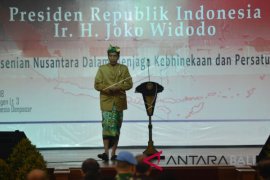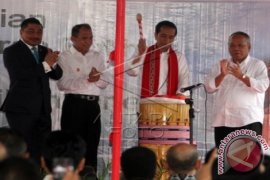Jakarta (Antara Bali) - Infrastructure is one of the backbones of economic growth so the government will retain its focus on infrastructure development this year.
Last year, infrastructure did not function optimally in supporting economic growth.
Moreover, many damaged infrastructural facilities have not yet been repaired. This has hampered industrial progress and efforts to improve the competitive edge of products.
Therefore, according to Prof Werry Darta Taifur, economic analyst of West Sumatras Andalas University, the government will still focus on building infrastructure this year.
"I am convinced that infrastructure is the backbone of Indonesia in reinforcing its economic growth," Werry said in Padang on Tuesday.
Werry argued that, up to last year, infrastructure in the regions was not maximally utilized and many facilities needed improvement. As a result, economic activity, notably industrial development, was hindered and failed to increase product competitiveness vis--vis overseas goods.
"Developing infrastructure will also drive the development of industries. Thus, weaknesses in the infrastructural sector should soon be improved," the Andalas University professor said.
In this context, the National Development Planning Board (Bappenas) has included infrastructure in the governments three focus areas of national development in 2017 to drive forward the economy.
Outlining the governments programs, Bappenas said infrastructure, services and manufacturing are the three main sectors that will be accorded priority this year.
The three sectors are prerequisites for a country to progress, Bappenas chief and National Development Planning Minister Bambang Permadi Soemantri Brodjonegoro said in Jakarta last Saturday.
Infrastructure, which is instrumental in pushing economic growth, is still inadequate. The sector can provide a lot of employment, both in projects under construction and those already operational.
The government has projected investments of Rp4,000 trillion until 2019 on infrastructure projects. Of this, the private sector is expected to invest about two-thirds or Rp2,667 trillion while the government will invest the remaining Rp1,333 trillion.
Infrastructure projects, especially ones related directly to the public interest such as toll roads, airports and seaports, are highly attractive for the private sector. Toll road projects in Java are almost certain to be profitable.
When private investors build a power plant and state-owned power firm PLN buys the power at a take or pay price prospective investors would be interested. As long as the investment and the selling price to the national power utility are reasonable, they will be interested.
The second sector is services, which includes tourism, communications and information services, financial services and other services. "Service sector also has to be expanded. The manufacturing sector is not enough as we need sectors that provide many jobs. Tourism has potential," Minister Bambang said.
Therefore, the government will also focus on manufacturing to make economic growth sustainable and competitive.
"We have to revive and push development of the manufacturing sector with products that are competitive both in domestic and global markets," Bambang said.
The government will avoid dependence on natural resources in carrying forward its development agenda in 2017. It will seek to create a sustainable economic development program in the future. Growth is no longer dependent on commodities and natural resources, which are very vulnerable to fluctuation.
Bambang said the economy improved in 2016 from 2015 when commodity prices, which had hit rock bottom, rebounded in 2016.
Basically, the government wants to avoid relying on resources that are highly vulnerable to sharp fluctuations. It no longer wants to see the economy beset by extreme ups and downs such as high dependence on exports of less competitive commodities. When prices fall, exports lose their sheen in economic growth.
The countrys economy has been badly hit by its dependence on a number of commodities, therefore, the government is set to reduce dependence on one commodity for growth.
The time has come for the government to seek to create sustainable economic growth, to minimize the impact of commodity price falls in future.
For this, services sectors such as tourism will be boosted to drive economic growth while infrastructure will be developed to support services and manufacturing.
"In essence, investment in infrastructure, services and manufacturing will boost growth, " said Prof Werry Darta Taifur.(WDY)





